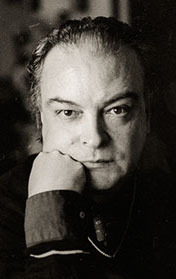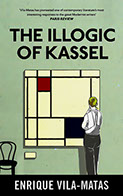

The Illogic of Kassel
By Enrique Vila-Matas
(New Directions, 2015)
The Spanish meta-fictional master Enrique Vila-Matas has devoted his considerable observational acumen to problems specific to men obsessed, almost to the point of illness, with literature.
In his latest novel, The Illogic of Kassel, an unnamed narrator who seems to share many traits with the Rómulo Gallegos Prize-winning author, receives an odd and enticing phone call from a woman calling herself Maria Boston. Engaging our narrator in a sort of word play phone game meant to, one supposes, foreshadow all the shifting contexts to come, Boston says that she represents the curators of a legendary art exhibition in Kassel, Germany, called Documenta 13, and that this avant-garde group would very much like him to participate in their upcoming program.
Our narrator, suffering the pangs of ecstatic mornings and horrific nights, seems to be in the throes of a great bipolarity. He agrees to participate, as he eager to go on any metaphysically medicinal journey that might even him out. In any deal with the devil, however dialectic, there is always a catch, and for the hero of The Illogic of Kassel this catch requires that the vacationing author must spend several days as a kind of performing writer at a Chinese restaurant called the Dschingis Khan.
 Writing (or pretending to write) in public is lacerating for the man, whose mind goes to meditations on Kafka, Dali, the weekly couch gags on The Simpsons, and finally the value of McGuffins, those much-lauded plot devices popularized by Alfred Hitchcock which drag characters along a story, or in the case of this Vila-Matas novel, drag a writer along the daily toils of his life.
Writing (or pretending to write) in public is lacerating for the man, whose mind goes to meditations on Kafka, Dali, the weekly couch gags on The Simpsons, and finally the value of McGuffins, those much-lauded plot devices popularized by Alfred Hitchcock which drag characters along a story, or in the case of this Vila-Matas novel, drag a writer along the daily toils of his life.
“The most perfect McGuffin is in The Maltese Falcon, the most misleading film in the history of cinema,” writes Vila-Matas. “John Huston’s movie tells of the search for a small statue, which once belonged to the Knights of Malta. Much is said about it---they never stop talking in the film---but in the end the coveted falcon, for which some have been murdered, turns out to be merely the element of suspense that has allowed the story to advance.”
At the end of the The Maltese Falcon, film buffs will recall Humphrey Bogart’s Sam Spade character stroking the McGuffin that has been the undoing of so many and, cribbing a line from Shakespeare’s The Tempest, calling it “The stuff dreams are made of.”
For the sleepless narrator of The Illogic of Kassel, and perhaps for a good number of somber literary aesthetes out there, the comforting bait-and-switch technique of McGuffins, which is not unlike being hip to the high and low cultural asides that speckle contemporary life, is perhaps the stuff all waking life is made up of as well.
Roberto Ontiveros